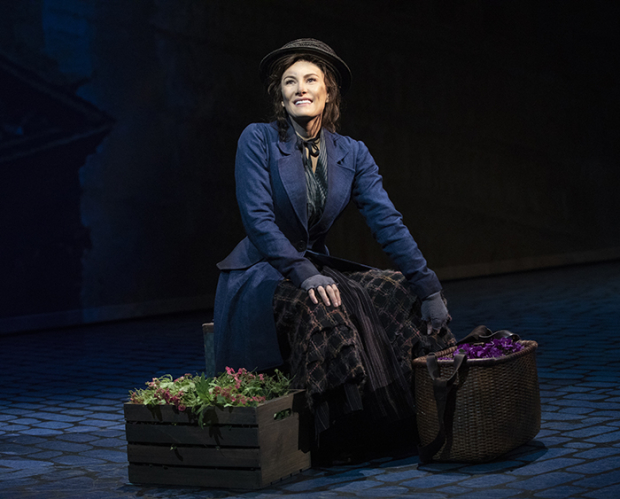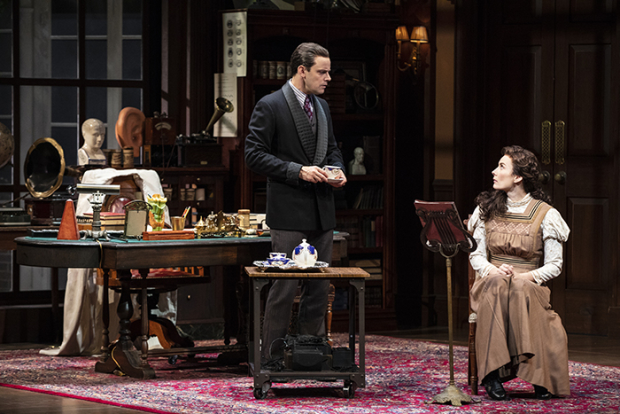After 30-Plus Years of Dreaming, Laura Benanti's Eliza Is Different Than She Imagined
If you follow Laura Benanti on social media or otherwise, you know three things about her: She loves being mother to her almost-2-year-old daughter Ella Rose; she's stressed about the state of the world (and sometimes processes her anxiety via late-night Melania Trump impressions); and Eliza Doolittle has been her dream role since she could take in solid food.
Her outspoken transparency about that last one, she freely admits, has been a kind of pell-mell version of The Secret, a strategy she describes as: "I'm just going to keep putting this out there and hope someone's like, 'Ugh, shut her up and give her the part.'"
Consider it a win for persistence because this past October, Benanti began her Broadway run as Eliza Doolittle in director Bartlett Sher's Tony-nominated Lincoln Center Theater revival of My Fair Lady at the Vivian Beaumont Theater. As a replacement for the show's original star Lauren Ambrose (something she hasn't done since taking over for Rebecca Luker as Maria in The Sound of Music at 18), she comes in without the pomp and circumstance of a Broadway opening, without a proper rehearsal period, and without any potential for accolades. But perhaps dreams can be even more potent when they arrive with a measure of humility and a rave review from your daughter ("Good singing, Mama!") that could fit perfectly on a marquee.

(© Joan Marcus)
This interview has been condensed and edited for clarity.
How are things going over at My Fair Lady?
It's going really well. This company has been just so wonderful to me. And it's my dream part, so the fact that I get to do it, especially when I had made peace with the idea that I never would, it's just such a gift. Even when I'm absolutely exhausted from being up all night with my child, when I get to the theater, I'm just so grateful that I am there singing these songs and playing this part.
I've learned that you were raised on the Julie Andrews Original Broadway Cast Recording as opposed to the Audrey Hepburn movie.
I've never seen the movie. Even as a 5-year-old knowing that Julie Andrews was not chosen to play the part that she originated, I refused to watch it. And I knew that Marni Nixon did the voice, and Audrey Hepburn didn't sing for herself. I only knew these things because my mother told me.
What was it about the album that you found so enchanting?
The music. My mother would read me the album insert of the lyrics, and we talked about the story of the show. As a child, the idea that someone could start with basically no options, and through her persistence and hard work, create a very different life for herself, was so interesting to me. And also I just loved Julie Andrews. Anything Julie Andrews-related, I was in.
How does the Eliza you've been crafting in your head for decades compare with the one you've arrived at organically onstage?
I didn't realize how deep I was going to have to dig. I almost always come from a place of humor, and it didn't really hit me until I was doing it how painful some of the scenes are. I think that's especially true because I'm twice the age of what the role is written for, so I have to come at it from the truth that I'm 39 years old. What does a person who has sold flowers her entire life, who's lived life on the street for probably 30 years — what is that? The humor comes easily to me, so the more challenging part is always breaking myself open a little bit more and allowing myself to be more vulnerable than I'm comfortable being.
Are you glad My Fair Lady came to you at this point in your career as opposed to the time in your life when you did The Sound of Music?
It's a different experience. I'd love to do The Sound of Music again because I think I would come at it from a different place. Back in the day, Mary Martin and Ethel Merman were still playing these parts in their late 30s and 40s, so I'm hoping to follow in their footsteps.
As a kid, did you root for Eliza to end up with Higgins, Freddy, or neither one?
I think because I knew that she ended up with Higgins, that's what I rooted for. Because that's what I was told to do — just like we were indoctrinated with Cinderella and Sleeping Beauty and Snow White and all those girls who aspire to nothing more than a prince who is going to save them from themselves. Stories are so powerful when you're young, and it's why I'm careful with what I read my daughter. It seeps into your marrow.
This is a My Fair Lady for the #TimesUp generation. If you are a feminist, as I am, and you're frustrated by the typical musical-theater ending, you'll be able to enjoy all the parts of it that you always loved and be gratified by a modern take on the ending. It actually more closely aligns with the source material. Shaw was brilliant at looking at culture and class, and Bart [Sher] is a master at taking these older shows and making them feel new. He restored a lot of the original text from Pygmalion that is not normally in the musical version.

(© Joan Marcus)
I saw on Instagram your daughter came to see the show! Was that exciting for you?
I was so excited for her to see it. She saw the first hour. Halfway through the Ascot scene at the races she turned to my husband and said, "Food." And then waved to the stage and said, "Bye-bye, Mama."
Did she enjoy it?
She loved it. She's still talking about it — she says, "Good job singing, Mama!" I was more nervous for her to see it than anyone else. It's so meaningful to me because my mother was an actress and gave it up because she didn't have the support system that I have. It is not lost on me how lucky I am. I'm overwhelmed by this tremendous gratitude on a minute-to-minute basis while also feeling so helpless and angry about the state of our world.
Was that your motivation for putting together the Singing You Home album?
I was working with my pilates instructor and I was just sobbing, and she said, "You need to do something. You're not a person who lays around crying." And I was like, "What am I going to do, sing?" And she said, "Yes. Do that." That day I texted everyone and by the end of the day, everyone had said yes. Warner Records gave us the studio, they gave us the technicians, [music director] Mary-Mitchell Campbell found musicians, Jason Robert Brown wrote a song for Audra McDonald to sing, which is our title song, and we did it. We made it happen and I'm really proud of it.
It's a dual-language children's album, and the net proceeds go to RAICES, the organization in Texas working full-time to reunite families separated at the border, and ASTEP, which helps the unaccompanied minors remain and work. My hope is that someone will give this to their Trump-loving uncle and not tell them what it benefits. And they will hear the voice of Isabella Preston — the little girl who's the first voice that you hear singing in Spanish on our album — and they'll be reminded for a moment that children are people.











